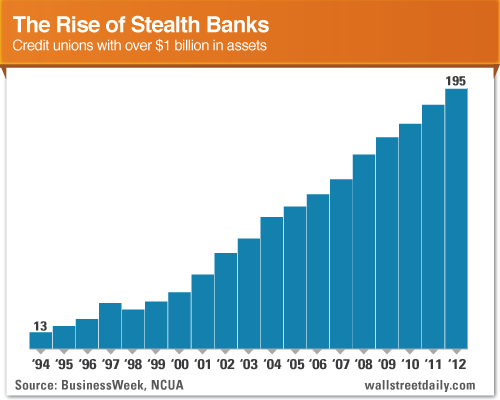- Mark Twain
I’d have to disagree with Mr. Twain.
While holding fast to misconceptions can certainly ruin us, ignorance can get us into big trouble, too.
I mean, how many people would have scooped up real estate in 2007 if they’d known that Goldman Sachs (GS) had a $13.9 billion bet (dubbed “the big short”) against subprime mortgage-related securities at the time?
Not one!
With that in mind, it’s time to unmask the next potential crisis to hit the financial markets… before it’s too late!
All is Not Well With Banks
Longtime readers know that I’ve been chronicling the steady improvement in the financial sector. Thankfully, the latest data indicates that the positive progress is continuing…
The FDIC’s official tally of “problem banks” keeps declining. In fact, the number has retreated for seven consecutive quarters.
Even the unofficial number of problem banks is on the mend. (This is a broader measure, which includes institutions that have received enforcement actions by the Office of the Comptroller of the Currency.) The list now includes 770 banks with assets of about $285 billion, compared to 929 banks a year ago.
Don’t let that fool you into thinking that all is well in the banking world, though.
What you might not know is that the FDIC’s list only includes federally insured, traditional banks. It doesn’t include any of the 6,819 federally insured credit unions.
Most Americans don’t realize this, and therein lies the problem…
The Rise of Stealth Banks
Here’s what the bureaucrats at the FDIC don’t want us to know…
While traditional bank failures have been falling since 2010, credit union failures have remained steady at about 15 per year. And the fact that we’ve hit six so far in 2013 suggests that we’re on track for another average year.
However, I’m convinced the number could start climbing. Here’s why…
Over the last 20 years or so, the reach of these supposed “small, risk-averse and family-run” credit unions, as BusinessWeek puts it, keeps expanding. No longer are credit unions confined to serving small, local markets. Consider:
- A total of $1.02 trillion in assets is now held in credit unions, based on the latest data from the National Credit Union Administration (NCUA).
- About 20 years ago, there were only 13 credit unions with over $1 billion in assets. By comparison, there are almost 200 today. So we’re talking about a 1,400% increase in the number of large credit unions.

To really put that growth in perspective, consider that over the same period (1994-2012), the number of traditional banks with over $1 billion in assets only increased by roughly 40%.
Much More Than a Community Lender
Bad things happen when financial institutions extend far beyond their original intent. And right now, credit unions have definitely done so.
Or as Keith Leggett, Senior Economist for the American Bankers Association, notes, “credit unions have evolved” to the point where a meaningful number are now competing directly with banks.
The real danger comes in when we realize that the insurance fund that backstops the credit unions’ aggressive growth practices stands at only $11 billion.
So all it would take to wipe out the fund entirely is for one of the four credit unions with assets of over $10 billion to fail.
I’m not saying such a failure is imminent. But I am saying that credit unions have grown too fast for their own good, and there probably isn’t enough insurance to cover the consequences of a disaster.
The good news?
Credit unions are non-profit entities and are owned by their members. So none are publicly traded. That means we don’t have to worry about owning a “problem credit union” in our portfolios.
The bad news? The key benefits that we associate with credit unions – like better interest rates and lower fees – might become a thing of the past.
Either because the companies can’t keep them and still grow enough to compete with traditional banks. Or worse, because they start going belly-up at an increasing rate.
Original post
